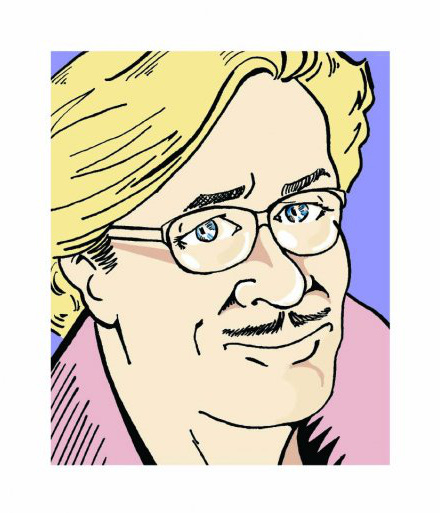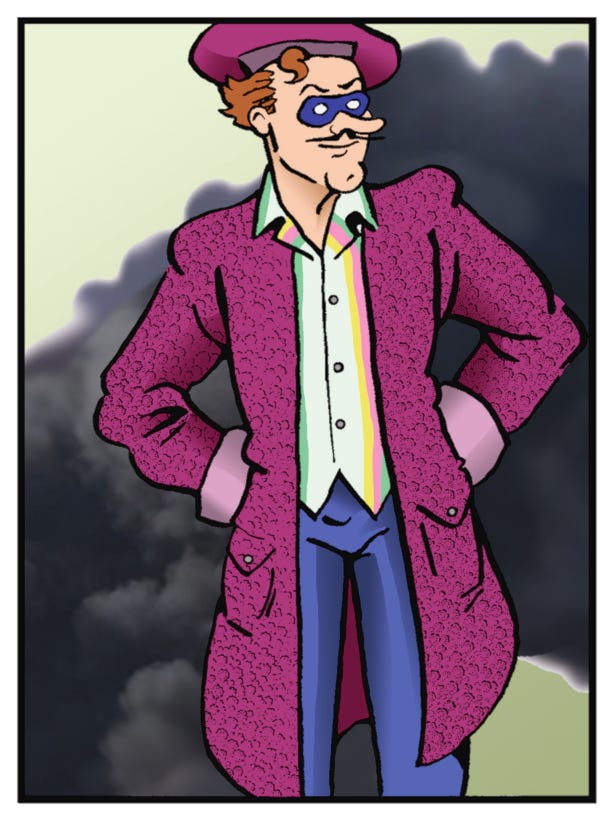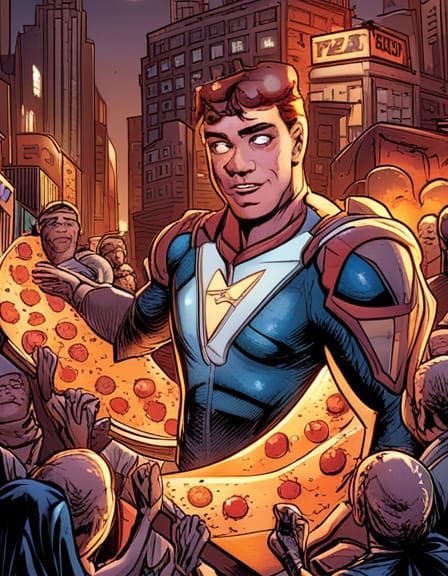Scrambling on Wednesday night to brainstorm my dispatch for this week, I’ve suddenly realized: Wednesday's the old-school new comic book day that would’ve had me excited as lad! So—since : 1. I’ve told you twice now that I write indie comics; 2. I publish these dispatches on Sundays; and, 3. I understand writers on Twitter promote themselves on #ShamelessSelfPromotionSunday—let me tell you all about Local Interest Pulp, illustrated by Dave La Violette.
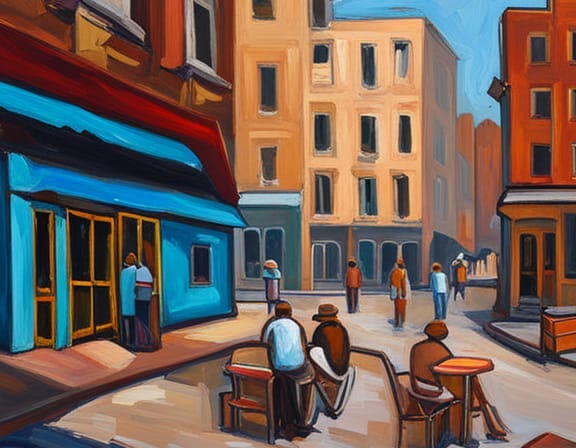
Dave and I met as fellow patrons of a neighborhood coffee shop in Uptown Minneapolis. (At this point, “Uptown” should be read as irony.) In fact we became friends while the shop was shuttered, when he and a few others would gather on the sidewalk in front of the coffeeshop during the pandemic lockdowns of Spring 2020. I rented a room in a house on the same block, and so when I looked outside my window and saw these erstwhile patrons gathered, I’d step outside and join them.
Over time we became friends, and discovered our shared political outlooks. (Dave even introduced me to The Corbett Report, which I featured in my last dispatch, in late 2020 with a video on Agenda 21, dating to 2012.) I learned too about his time as an actor and stuntman. Though his agent died some years ago, we recovered the following biography from an oily napkin sandwiched between a pair of headshots left over from the estate:
Dave La Violette's decades-long career in the film and television industry started with the film, "Summerhawk", followed by numerous TV shows such as "Flying Cloud", "The Blue Musketeer", "Cop-Girl", and "Ragtime Ocean Boulevard". After decades of stunt work, small bit parts, and historical re-enactments, La Violette toured the US Midwest and Canada in his one-man show playing Buffalo Bill Cody, before he finally turned in his SAG-AFTRA Union card and settling into the safer and less physically demanding work of cartooning.
Discovering our mutual love of comics, we eagerly assembled a storyline from our observations of life in Minneapolis, MN following the George Floyd protests of 2020. We called it Local Interest Pulp in honor of the “local interest stories” who first captured our imaginations as they loitered on the sidewalk, including one neighborhood fixture in particular who became over time our hero’s inspiration: a fellow customer at our local coffeeshop named Patrizio della Luna who first introduced himself as a writer, but who had worked in fact as a delivery driver before the riots demolished his employer’s restaurant.
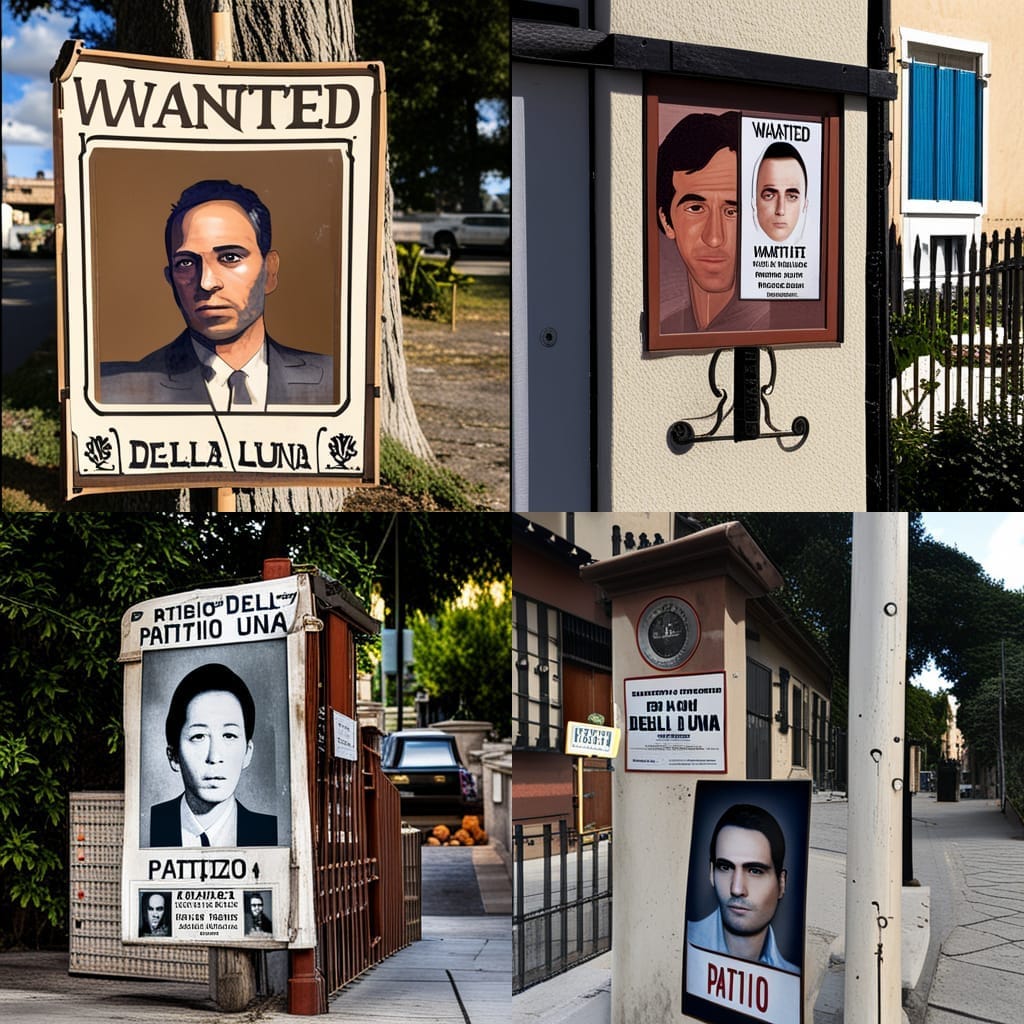
I think he kind of had a breakdown, because he told us he was squatting at the library, absorbing through nocturnal proximity all the genius required to write a new chapter in American literature. Watching him pilfer the little free library in the garden outside the coffeeshop, I saw him take some mostly empty journals I’d put in there myself dating to what I remember as my own heyday, and learned later that they’d had some influence on his work.
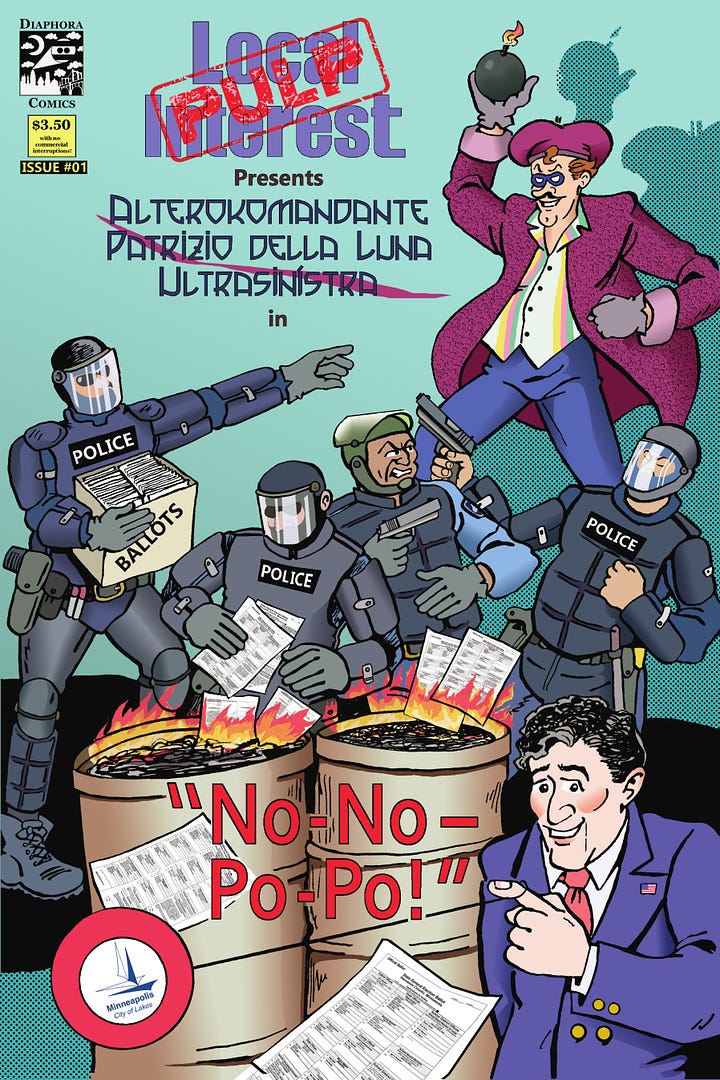
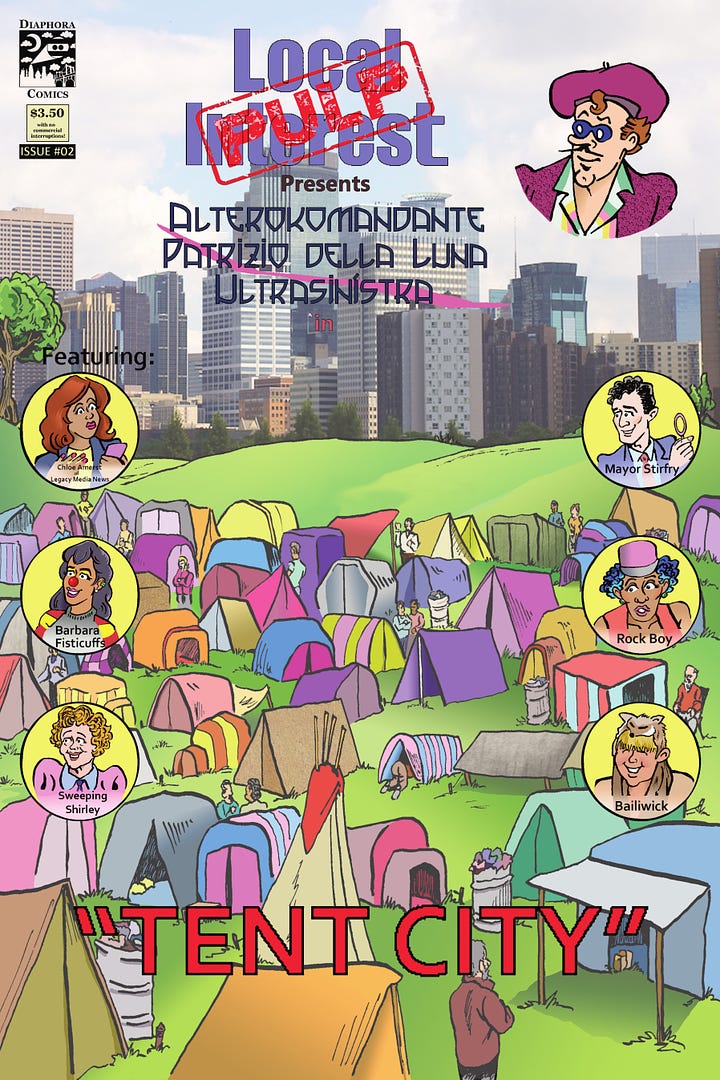
Flash forward three years, and our project has even managed to chart on Amazon. (Whatever that really means.) Though Patrizio della Luna has disappeared from the neighborhood since the pandemic’s end, Dave and I are in production on our third issue, and for us it’s like he never left. (By that I mean we’ve still got enough other wing-nuts crowding the sidewalks around here for us to fill in the gap of his absence.) In Local Interest Pulp, he stars as the revolutionary Alterokomandante Ultrasinístra struggling to maintain his liberty and his anonymity.
If I told you only that we aimed to furnish a satirical take on city politics and the power dynamics of urban decay, maybe that would cover it: an ineffectual municipal government responds to a contrived pandemic with a mask mandate, and the populist opposition demonstrating against it mistakes our Alterokomandante (AKDTE) as one of the mandate’s supporters because of his domino mask; the city suffers a catastrophic housing crisis after lockdowns have crashed the economy, but rather than enacting any policies to relieve it, the bumbling Mayor Stirfry criminalizes homelessness to profit the prison-industrial complex, forcing AKDTE into a desperate gambit to protect the residents of “Tent City”; I think we just aim to tell stories as bizarre as what jumps out at us day-to-day.

Regardless of how close we come to hitting that mark, we sure have fun with it. Our readers seem to like it too. As one wrote to the illustrator after reading the print release, “I read your comix and they are exceptional! Outstanding work! [...] How in hell did you come up with such a great finished project?”
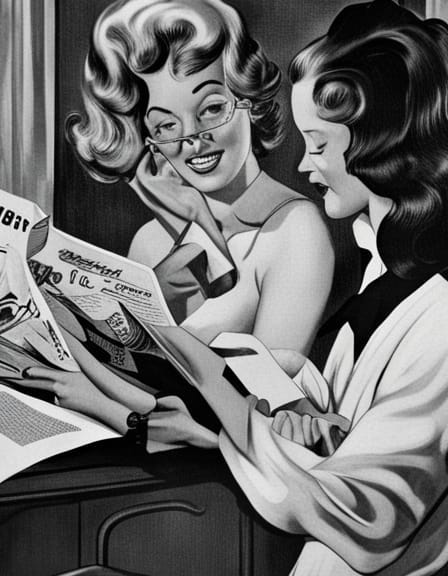
Another wrote via email, “I read them. Passed them on to another person. I liked them but I think the bathrobe-wearing guy [AKDTE] is a troublemaker. He has his thumb in a lot of pies like Little Jack Horner, but he's pulling out turds instead of plums. We better keep an eye out on that rebel rouser [sic]. Ha.”

A third wrote thoughtfully of the epigraph closing the first issue’s denouement, “I like Robert G. Ingersoll’s quote: ‘We can be as honest as we are ignorant. If we are, when asked what is beyond the horizon of the known, we must say that we do not know.’ He sounds like an interesting agnostic. The quote reminds me of the conclusion of Ludwig Wittgenstein’s Tractatus: ‘Wovon man nicht sprechen kann, darueber muss man schweigen.’ If there’s a limit to what we know, don’t bother pretending to claim any knowledge of the other side, or even whistling it."

To me that last review feels perhaps most meaningful of the lot, of course because our reader could find anything in common between the Tractatus and our indie comic. Though such charity obviously doesn’t indicate that Local Interest Pulp attains to the levels of genius apparent in art’s great works, to think that it might inspire in its reader a generosity of spirit akin to the spirit (in my own interpretation, at least) which Darren Allen identifies as the trademark of genius: “every great story that has ever been told—love story or otherwise—is founded on sacrifice, on giving up self in order to experience that which cannot be understood [....] This giving up he does for what his self cannot grasp—what the author cannot directly speak of—but which something else, something ‘beyond’ self, yearns for.”
I must confess, I feel a deep pride now to think that a comic written and drawn first for our own entertainment might point any reader in the direction of that desired unknown: to help anyone locate oneself once again in what I might call a wild world (to repurpose another brilliant thought of Allen’s, looted here rather faithlessly) upon seeing our society’s reflection in the funhouse mirror that appears in the panels of our comic book. We might not ever restore a reader to anything like an awareness of what lies beyond one’s own grasp—some radical primality, or anything else that attempts to capture what it means to exist as a contingent creature on our mad planet—but if our little devotionals can lead our readers back toward it, that sounds like a worthy accomplishment.
Of course, our Alterokomandante isn’t a superhero in the sense of one who overcomes insurmountable obstacles, such as whatever an alien invasion might symbolize during the time of the story’s writing, and he has no powers to defy the known laws of physics. Despite this deficiency, however, I see definite value in pitting a hero against the common problems of a time and place, and perhaps in some cases we might see the benefits compounded when readers enjoy stories about a hero with no more ability than they to address the problems they too face each day and who attempts it nonetheless.
Maybe those who pick up Local Interest Pulp after reading this dispatch will think I’m being fanciful. After all, they might think, we’ve done little except stage the obvious detriment to society that results from the domestic policies of neoliberal austerity: it doesn't take much effort to make that look absurd, and twisting the material from tragic to comic may even cost us further points. (I haven’t considered this yet, but I’m finding it easy to guess the arguments of imaginary critics on the internet.) Not everyone looks for comics with “a take on politics that reads between the lines”, as another kind reviewer put it, while perhaps others yet will think our take on politics is infantile.
If you’re only interested in political takes that repeat the party lines of today’s American duopoly, then farewell and good fortune to you. I believe our society faces problems far too urgent for its art to shy away from critical engagement with politics. (Though as you might guess from my last dispatch’s discussion of the Pentagon’s influence on Marvel movies, I wouldn't shy away either from discussing the proper posture for art's engagement.) The 250% increase in family homelessness in Minneapolis' Hennepin County in 2022 is only one manifestation of a crisis that I watch play out just by standing in front of a coffeeshop and counting how many people look like they have nowhere to go.
I’m glad, of course, to read about it from members of the state legislature, but I think it’s telling that the problem has festered for so long that two relative amateurs have had time enough to stage it in an indie comic and print runs of two issues. Whatever its shortcomings vis a vis theories of analytic ontologies, the story engages the issues of its time, which seems to me one of its most outstanding virtues.
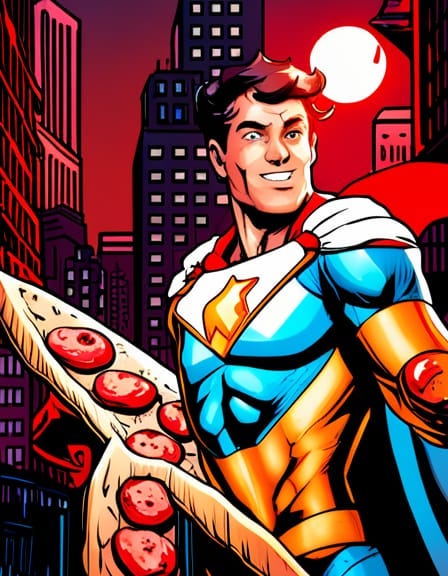
If you think the take is infantile, however, then I respect your opinion a little more, or at least enough to make a case to you. The presentation might not match your aesthetic, but I have some evidence now to say we have the pulse on a local beat: Local Interest Pulp #2 appeared on Amazon on 19 April 2023, and if you read the last page, you'll see why Dave and I now congratulate ourselves on foreshadowing strategies proposed to combat the housing crisis in Minneapolis reported on 1 May.
But even if I’ve predicted now a pair of the most common opinions of the story (predictions of conversations in municipal gov’t offices set aside for now), I’ll console myself to remember the reviewer who called our first issue “a brilliantly illustrated non sequitur” thanks to Dave’s cartooning, and to presume therefore that others will appreciate his art too. For all I know, that’s the only real substance to any signal that any reader can use to find their bearings once more in what I called “the wild world” and my own words do nothing to provoke in our readers the generosity required to rediscover it.
Still, if that’s the full extent of my accomplishments here, I’m glad for it regardless. Even if I’ve done nothing more than gild a few cartoons, reading their reviews assures me it wasn’t a waste.





